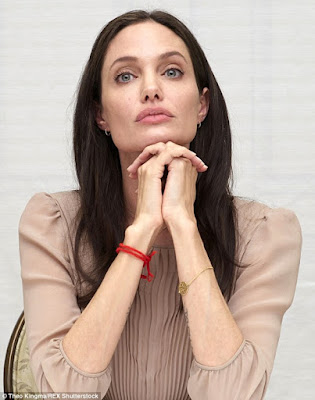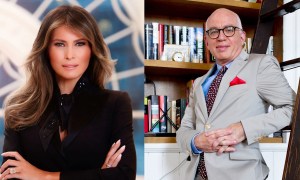Angelina Jolie has addressed Donald Trump’s Travel Ban in an essay published in the NewyorkTimes.. The film maker and special envoy of the United Nations High Commissioner for Refugees wrote
Refugees are men, women and children caught in the fury of war, or the
cross hairs of persecution. Far from being terrorists, they are often
the victims of terrorism themselves.
I’m proud of our country’s history of giving shelter to the most
vulnerable people. Americans have shed blood to defend the idea that
human rights transcend culture, geography, ethnicity and religion. The
decision to suspend the resettlement of refugees to the United States
and deny entry to citizens of seven Muslim-majority countries has been
met with shock by our friends around the world precisely because of this
record.
The global refugee crisis and the threat from terrorism make it entirely
justifiable that we consider how best to secure our borders. Every
government must balance the needs of its citizens with its international
responsibilities. But our response must be measured and should be based
on facts, not fear.
As the mother of six children, who were all born in foreign lands and
are proud American citizens, I very much want our country to be safe for
them, and all our nation’s children. But I also want to know that
refugee children who qualify for asylum will always have a chance to
plead their case to a compassionate America. And that we can manage our
security without writing off citizens of entire countries — even babies —
as unsafe to visit our country by virtue of geography or religion.
Refugees are in fact subject to the highest level of screening of any
category of traveler to the United States. This includes months of
interviews, and security checks carried out by the F.B.I., the National
Counterterrorism Center, the Department of Homeland Security and the
State Department.
Furthermore, only the most vulnerable people are put forward for
resettlement in the first place: survivors of torture, and women and
children at risk or who might not survive without urgent, specialized
medical assistance. I have visited countless camps and cities where
hundreds of thousands of refugees are barely surviving and every family
has suffered. When the United Nations Refugee Agency identifies those
among them who are most in need of protection, we can be sure that they
deserve the safety, shelter and fresh start that countries like ours can
offer.
And in fact only a minuscule fraction — less than 1 percent — of all
refugees in the world are ever resettled in the United States or any
other country. There are more than 65 million refugees and displaced
people worldwide. Nine out of 10 refugees live in poor and middle-income
countries, not in rich Western nations. There are 2.8 million Syrian
refugees in Turkey alone. Only about 18,000 Syrians have been resettled
in America since 2011.
This disparity points to another, more sobering reality. If we send a
message that it is acceptable to close the door to refugees, or to
discriminate among them on the basis of religion, we are playing with
fire. We are lighting a fuse that will burn across continents, inviting
the very instability we seek to protect ourselves against.
We are already living through the worst refugee crisis since World War
II. There are countries in Africa and the Middle East bursting at the
seams with refugees. For generations American diplomats have joined the
United Nations in urging those countries to keep their borders open, and
to uphold international standards on the treatment of refugees. Many do
just that with exemplary generosity.
What will be our response if other countries use national security as an
excuse to start turning people away, or deny rights on the basis of
religion? What could this mean for the Rohingya from Myanmar, or for
Somali refugees, or millions of other displaced people who happen to be
Muslim? And what does this do to the absolute prohibition in
international law against discrimination on the grounds of faith or
religion?
The truth is that even if the numbers of refugees we take in are small,
and we do the bare minimum, we do it to uphold the United Nations
conventions and standards we fought so hard to build after World War II,
for the sake of our own security.
If we Americans say that these obligations are no longer important, we
risk a free-for-all in which even more refugees are denied a home,
guaranteeing more instability, hatred and violence.
If we create a tier of second-class refugees, implying Muslims are less
worthy of protection, we fuel extremism abroad, and at home we undermine
the ideal of diversity cherished by Democrats and Republicans alike:
“America is committed to the world because so much of the world is
inside America,” in the words of Ronald Reagan. If we divide people
beyond our borders, we divide ourselves.
The lesson of the years we have spent fighting terrorism since Sept. 11
is that every time we depart from our values we worsen the very problem
we are trying to contain. We must never allow our values to become the
collateral damage of a search for greater security. Shutting our door to
refugees or discriminating among them is not our way, and does not make
us safer. Acting out of fear is not our way. Targeting the weakest does
not show strength.
We all want to keep our country safe. So we must look to the sources of
the terrorist threat — to the conflicts that give space and oxygen to
groups like the Islamic State, and the despair and lawlessness on which
they feed. We have to make common cause with people of all faiths and
backgrounds fighting the same threat and seeking the same security. This
is where I would hope any president of our great nation would lead on
behalf of all Americans.














